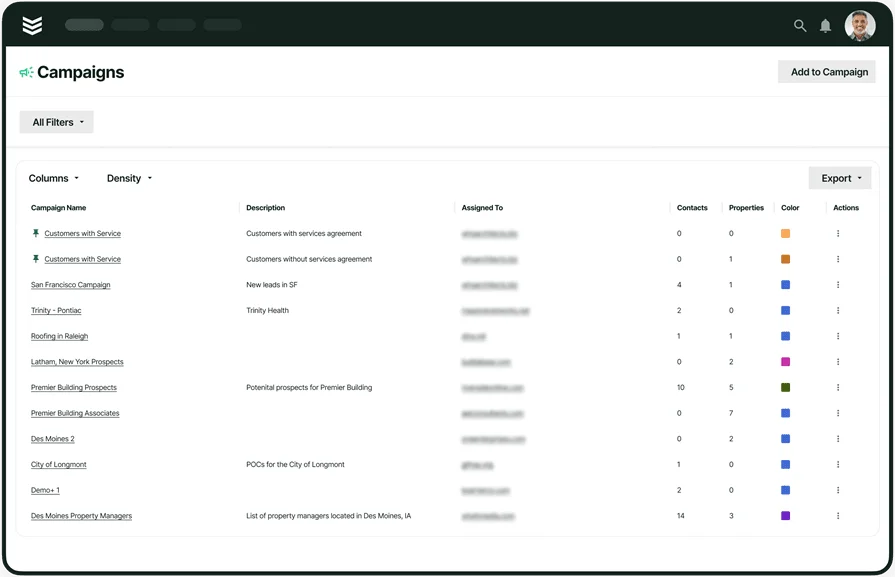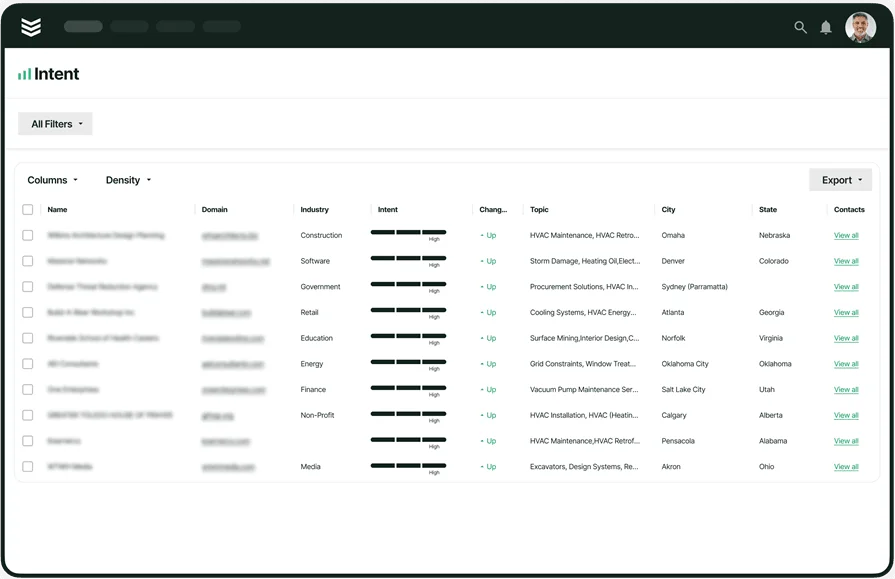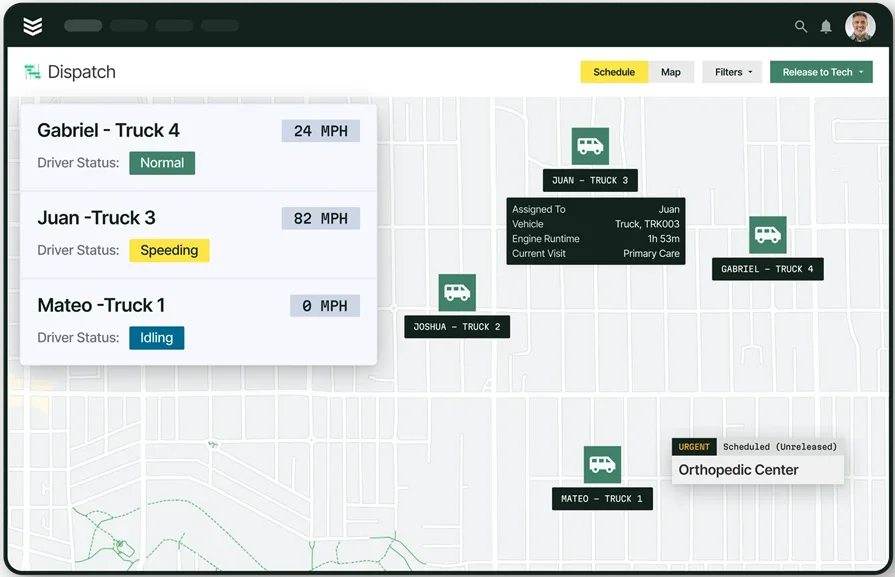Construction work is nonstop—it requires you to keep up with bids, juggle multiple projects, and manage crews in the field. A CRM built for contractors makes it easier to track leads, organize customer data, and keep jobs moving without the back-and-forth. The right system cuts down wasted time, helps win more bids, and keeps your team on the same page.
This guide breaks down how to choose the best CRM, the must-have features, and the top options for construction businesses.
- Choosing a CRM for construction
- 6 key features to look for in a CRM software for construction
- 8 best CRMs for construction professionals
- 5 benefits of using CRM for construction companies
- 5 important CRM software FAQs answered for construction companies
A solid system keeps bids, customer details, and job schedules organized without extra hassle. Let’s dive into what to consider when choosing one for your business.
Choosing a CRM for construction
Choosing the right CRM means more than storing contacts. Contractors need a system that tracks bids, manages projects, and keeps teams connected from the office to the job site. The right tool should streamline workflows, reduce miscommunication, and improve job tracking without creating extra hassle. Here are the key factors to consider:
- Job Tracking & Bid Management – Can it handle lead tracking, bid follow-ups, and contract management? Does it help you stay on top of project pipelines so no opportunity slips through the cracks?
- Integration with Field Operations – Does it sync with dispatching and scheduling tools? Can technicians access job details, client notes, and past service history on-site?
- Project Visibility & Collaboration – Does it give a clear view of active projects, pending jobs, and resource allocation? Can office staff and field crews update job statuses in real-time?
- Customization for Construction Workflows – Can you tailor it to fit your process? Does it support custom job categories, project stages, and reporting for commercial or residential work?
- Scalability & Ease of Use – Will it grow with your business? Is it simple enough for your team to adopt without weeks of training?
A CRM should fit how contractors actually work—not slow them down with unnecessary features or complex interfaces. Next, we’ll break down the must-have features that make a CRM effective for construction businesses.
6 key features to look for in a CRM software for construction
A good CRM does more than store contact info—it keeps bids, jobs, and customer interactions organized so nothing slips through the cracks. For contractors, the right system should handle job tracking, field team coordination, and project management all in one place. Here are five must-have features:
1. Lead and bid tracking
Keeping track of leads and bids manually costs time and opportunities. A CRM should log every potential project, estimate, and follow-up, so you know which bids are still open and which need attention. Look for a system that automates bid reminders and integrates with construction quoting software to speed up proposal creation.
2. Job scheduling and dispatch integration
Field teams rely on clear schedules to stay on track and minimize downtime. A CRM with built-in scheduling tools or integration with construction dispatch software ensures that project managers can assign crews efficiently and keep timelines in check.
3. Field service mobile app
Construction projects move fast, and field teams can’t afford to waste time checking in at the office. A CRM with a mobile app lets technicians, project managers, and supervisors access job details, update work orders, capture signatures, and communicate with the back office—all from their phones. Whether reviewing blueprints, logging material usage, or documenting site conditions, mobile access ensures crews have the information they need on-site and in real-time.
4. Customer and job history management
Contractors need quick access to job history, contracts, and customer details. A strong CRM keeps records organized so office staff and field crews can pull up previous jobs, warranty details, and site notes instantly. This is critical for repeat clients and long-term projects. Learn more about how field service CRM software helps streamline this process.
5. Real-time field communication
Miscommunication between the office and field teams leads to delays and errors. A CRM should allow crews to update job statuses, upload photos, and send notes from the job site. The best systems integrate with mobile apps so project managers get real-time updates and can adjust schedules on the fly.
6. Scalability and customization
Construction businesses evolve—your CRM should too. Look for software that adapts to growing teams, larger projects, and changing workflows. Whether you're a small contractor or managing multiple crews, a CRM designed for the industry—like CRM for contractors and commercial construction—can scale with your business.

Customer & crew management in one tool
Effectively manage jobs—and your client list—to keep projects moving.
Other valuable features for CRM construction software
- Automated Bid & Project Follow-Ups – Chasing down bids and project approvals takes valuable time away from the job site. A CRM with automated follow-ups ensures proposal reminders, contract approvals, and payment requests go out on time, so nothing slips through the cracks.
- Construction Document Storage – Blueprints, permits, RFIs, and change orders need to be accessible in the field and office. A CRM with built-in document management lets crews and project managers upload, share, and retrieve critical files from any job site, cutting down on miscommunication and lost paperwork.
- Job Cost & Performance Tracking – Staying profitable means knowing where time and money are going. A CRM with real-time reporting on labor hours, material costs, and project timelines helps contractors spot issues early, improve estimating, and maximize job profitability.
8 best CRMs for construction professionals
Choosing the right CRM depends on the type of work you do. A small residential contractor doesn’t need the same tools as a large commercial firm. Some systems focus on lead tracking and bid management, while others integrate scheduling, dispatching, and field service tools. Below, we’ve highlighted the best CRMs for different construction business needs.
1. BuildOps: best for commercial
BuildOps is designed specifically for commercial contractors, offering a powerful all-in-one platform that combines CRM, scheduling, dispatch, and project management. Unlike generic CRMs, BuildOps connects your office and field teams in real-time, making it easier to manage complex projects, recurring service contracts, and large-scale operations.
How Pricing Works: We provide live demos on a weekly basis and you can also request a demo at your convenience. This will allow you to explore the features and discover the perfect solution for your specific requirements.
Features Beyond CRM:
- Integrated dispatch and job scheduling to keep projects on track
- Advanced quoting tools to manage bids and estimates efficiently
- Mobile app for field technicians to access job details and update work orders in real-time
What Sets It Apart For Commercial: BuildOps is built exclusively for commercial contractors, offering industry-specific features that help manage large teams, streamline invoicing and CRM, track service contracts, and optimize job scheduling.

Explore our construction CRM
See how we help construction pros manage crews and get jobs done.
2. JobNimbus: best for residential
Image Source: JobNimbus
JobNimbus is a flexible CRM designed for residential contractors, especially in roofing, remodeling, and home services. It offers an easy-to-use interface with job tracking, customer management, and document storage to keep projects organized. Its built-in estimating and invoicing tools help contractors create and send quotes quickly.
However, JobNimbus is more tailored for smaller teams and lacks advanced dispatching features, which may not be ideal for high-volume operations.
How Pricing Works: JobNimbus offers tiered pricing plans, with costs depending on the number of users and features selected. A free trial is available for testing the software before committing.
Features Beyond CRM:
- Built-in estimating and invoicing tools to speed up job proposals
- Photo and document storage for tracking project details
- Workflow automation to manage tasks and follow-ups
What Sets It Apart For Residential: JobNimbus is simple, customizable, and built for residential trades, making it a great choice for small-to-medium home service businesses.
Learn more about JobNimbus’ construction project management & CRM software and how it helps residential contractors manage jobs efficiently.
3. Procore: best for general contractors
Image Source: Procore
Procore is a full-scale construction management platform with a CRM component, designed for general contractors handling large projects. It offers project tracking, document control, and team collaboration tools, making it useful for contractors managing multiple job sites.
One downside is that Procore can be complex for smaller businesses and has a higher price point compared to other CRMs.
How Pricing Works: Procore operates on a custom pricing model, with costs depending on company size and project volume. Businesses must request a quote to get detailed pricing.
Features Beyond CRM:
- Integrated project management tools for large-scale jobs
- Budget tracking and financial reporting for cost control
- Document collaboration for streamlined communication between teams
What Sets It Apart For General Contracting: Procore combines CRM with full construction project management, making it ideal for contractors who need an all-in-one platform.
Explore Procore’s construction CRM software and see how it helps general contractors streamline operations.
4. Contractor Foreman: best for small contractors
Image Source: ContractorForeman
Contractor Foreman is a budget-friendly CRM and project management tool built for small construction businesses. It offers basic CRM functions, estimating, scheduling, and job costing at an affordable price.
While it covers essential features, Contractor Foreman may not have the advanced automation and scalability that larger firms require.
How Pricing Works: Contractor Foreman has affordable monthly plans, with pricing based on feature access. A free trial is available.
Features Beyond CRM:
- Basic job scheduling and tracking
- Cost management tools for budget-conscious contractors
- Mobile app for on-the-go job updates
What Sets It Apart For Small Contractors: Contractor Foreman provides essential CRM and project management features at an affordable price, making it a great choice for small businesses looking to stay organized.
See how Contractor Foreman’s construction features can help small contractors manage projects without breaking the budget.
5. FieldEdge: best for specialty trade contractors
Image Source: FieldEdge
FieldEdge is a CRM built for specialty trade contractors, including HVAC, plumbing, and electrical businesses. It offers customer management, job scheduling, and invoicing tools, helping service businesses stay organized. The platform also includes automated follow-ups and performance tracking, ensuring contractors stay on top of every job.
One drawback is that FieldEdge is more tailored for service-based trades rather than general construction, making it less ideal for large-scale project management.
How Pricing Works: FieldEdge operates on a subscription-based pricing model, with costs varying based on company size and selected features. A demo is required for a quote.
Features Beyond CRM:
- Automated customer communication for follow-ups and scheduling
- Performance tracking tools to measure job efficiency
- Mobile field access for technicians and crews
What Sets It Apart for Specialty Trade Contractors: FieldEdge is designed to streamline operations for HVAC, plumbing, and electrical contractors, making service management more efficient.
Discover how FieldEdge’s construction CRM software helps specialty trade contractors manage jobs and customer interactions more efficiently.
6. Buildertrend: best for remodelers and home builders
Image Source: Buildertrend
Buildertrend is designed for home builders and remodeling contractors, offering tools for project management, customer communication, and job costing. It helps manage everything from initial estimates to final project completion, making it ideal for companies handling multiple residential builds or remodels.
However, Buildertrend may not be the best fit for contractors focused on commercial projects, as it is more tailored to residential construction workflows.
How Pricing Works: Buildertrend uses a tiered pricing system, with different plans based on the features needed. A free trial is available.
Features Beyond CRM:
- Job scheduling and progress tracking for home builders
- Document and blueprint storage for easy access in the field
What Sets It Apart for Remodelers and Home Builders: Buildertrend streamlines residential construction projects, helping home builders keep clients and crews on the same page.
Explore Buildertrend’s construction CRM software and see how it helps remodelers and home builders manage projects efficiently.
7. RedTeam: best for mid-sized construction firms
Image Source: RedTeam
RedTeam is a comprehensive construction management platform with a built-in CRM. It’s best suited for mid-sized contractors managing multiple projects, offering contract management, job costing, and financial tracking. RedTeam is a great option for companies that need both CRM and project management in one.
A downside is that RedTeam’s interface can be complex for smaller contractors, as it is built for larger workflows.
How Pricing Works: RedTeam offers custom pricing based on company size and project needs, with demos available upon request.
Features Beyond CRM:
- Full contract and document management
- Financial tracking and job costing
- Collaboration tools for teams and subcontractors
What Sets It Apart for Mid-Sized Construction Firms: RedTeam combines CRM with full project and financial management, making it a great fit for contractors handling multiple job sites.
Check out RedTeam’s different platform offerings to see how it helps mid-sized firms stay organized.
8. CoConstruct: best for custom home builders
Image Source: CoConstruct
CoConstruct is built specifically for custom home builders, offering tools for client communication, project scheduling, and financial tracking. It helps contractors manage client selections, change orders, and budgeting all in one platform.
While powerful for custom home builders, CoConstruct may not be the best option for general contractors handling commercial projects.
How Pricing Works: CoConstruct uses subscription-based pricing, with different tiers depending on features needed. A demo is available for pricing details.
Features Beyond CRM:
- Client portal for selection and communication
- Change order tracking and budget management
- Custom scheduling tools for builders
What Sets It Apart for Custom Home Builders: CoConstruct is designed to streamline communication and financial tracking for custom home builders, making it easy to manage client expectations and project budgets.
See how CoConstruct’s construction software helps custom home builders manage projects and client interactions with ease.

Compare software at a glance
Easily compare available CRM solutions for construction pros with this scoresheet.
5 benefits of using CRM for construction companies
The construction industry has many complexities, from overseeing multiple projects to coordinating various crews and managing bids. A CRM specifically designed for construction companies can optimize workflows, enhance customer relationships, and increase profits. Here’s how the right CRM makes a difference:
1. Organized bid and project tracking
Construction projects move fast, and losing track of bids or job progress means lost revenue. A CRM keeps all leads, estimates, and contract details in one place, ensuring that no opportunity falls through the cracks. If you're looking for a CRM solution that simplifies project tracking, check out this guide on construction contractor CRM for industry-specific recommendations.
2. Better scheduling and crew management
Coordinating field teams and job schedules is a difficult task if you don't have the proper tools to assist you. Using a CRM (Customer Relationship Management) system that integrates scheduling and dispatching features can improve this process. The CRM system can help assign crews to specific jobs, monitor the progress of each job, and prevent double bookings, which occur when multiple crews or teams are scheduled for the same job at the same time.
3. Improved customer communication
The construction industry isn't solely focused on the act of building; it also requires maintaining client satisfaction and keeping them informed throughout the process. CRM is a valuable tool in this regard, as it stores client history, automates follow-up communications, and centralizes all communication. This streamlined approach makes it significantly easier to stay attentive to and fulfill customer needs effectively.
4. Centralized document and job history management
Construction projects create a lot of paperwork, and a CRM system can help with organization and accessibility. Job files, contracts, permits, and change orders can all be stored in one place. This allows team members to have access to what they need, whether they are in the office or at the job site.
5. Scalability for construction businesses
As construction companies expand their operations and take on a greater number of projects, maintaining organization and efficiency becomes increasingly challenging. A CRM system designed for scalability can adapt to the company's growth by incorporating essential tools for job costing, workforce management, and financial tracking. This integrated approach ensures that all aspects of the business are managed effectively as the company expands.
5 important CRM software FAQs answered for construction companies
Keeping track of bids, juggling multiple projects, and managing crews in the field can get messy fast. The right CRM helps contractors stay on top of job details, streamline communication, and keep projects moving. Below, we answer key questions about how CRM software supports construction businesses.
1. What is CRM software for construction companies?
CRM software for construction companies centralizes bid management, client communication, project tracking, and job history. This streamlines operations, enhances customer relationships, and prevents missed opportunities, ultimately leading to increased efficiency and growth for your business.
2. How does CRM software for construction professionals work?
A construction CRM manages leads, organizes contracts, and schedules jobs, keeping field teams connected. It centralizes project information for easy access by all team members and often integrates with dispatch and estimating tools for improved workflow, resulting in efficient project management.
3. Why construction companies and contractors need CRM software
Without a CRM, projects, bids, and client details get lost in spreadsheets and emails. It helps contractors win more jobs, improve communication, and manage teams efficiently, making it a game-changer for growing businesses. Ultimately leading to increased revenue and improved customer satisfaction.
4. Is CRM software worth the cost for construction contractors?
Yes. A CRM reduces administrative time, prevents lost revenue from missed follow-ups, and increases efficiency. By automating workflows and organizing job details, contractors see better project management and improved profitability. This gives you more time to focus on winning and completing work.
5. What are some best practices to follow when implementing a CRM solution for construction?
Start by mapping out key workflows, training teams, and integrating CRM with existing tools. Ensure field and office staff use it consistently to track leads, jobs, and client history. A good system improves organization and overall project efficiency, leading to increased customer satisfaction.
Finding the right CRM for construction isn’t just about storing contacts—it’s about winning more bids, keeping crews organized, and improving customer relationships. The best tools help contractors track jobs, streamline scheduling, and eliminate paperwork headaches.
Not every CRM includes dispatching, field service tracking, or bid management—but BuildOps does. It’s built for commercial contractors who need all-in-one project management and CRM functionality without the hassle of using multiple disconnected tools.

Want to see how it works?
We help construction contractors run a more efficient, profitable operation.








